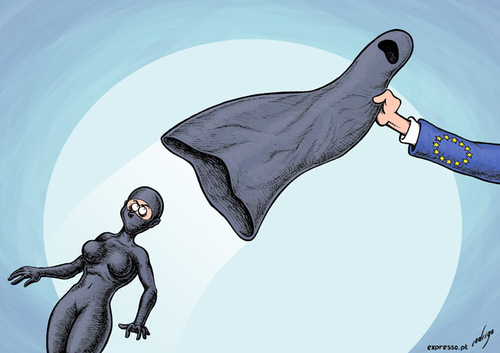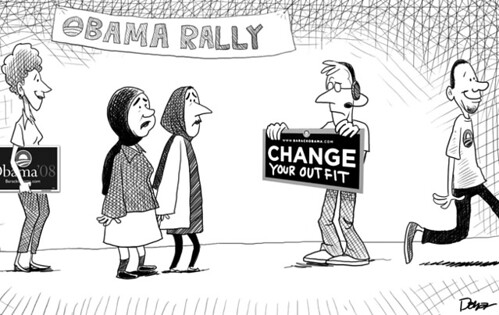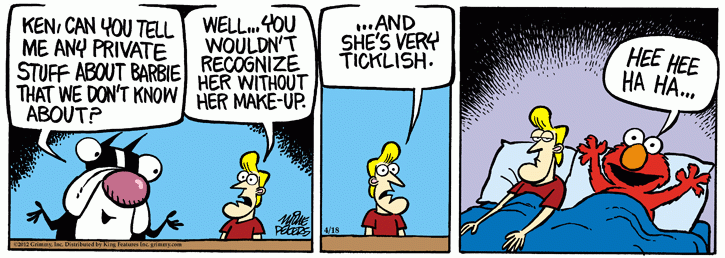Monday, July 23, 2012
Anything you can do I can do...but for less.
It's shocking that in today's society there are still cases of the gender wage gap. But after reading this article about Maine where women working full time are paid 22 percent less. Women working right next to their male counterparts, working the same tasks, but not making the same amount seems to be one of the most disappointing things. We've come such great lengths in gender equality, but this is truly unacceptable. It has even hit close to home, when I discovered that at my own place of employment there is gender inequality. Not on the sales floor, but for our dock associates, responsible for loads and unloading our new stock, men and women are paid differently and are assigned different tasks suiting their traditional gender roles. It just astounds me that these differences still exist. If you are going to hire somebody for a certain position then they should be allowed to work all the tasks involved and for equal pay.
TO VEIL OR NOT TO VEIL? A Case Study of Identity Negotiation Among Muslim Women in Austin, Texas
In the article, "TO VEIL OR NOT TO VEIL? A Case Study of Identity Negotiation Among Muslim Women in Austin, Texas" by Jen'nan Ghazal Read and John P. Bartkowski, the negative stereotype attributed to Muslim women is addressed.
The assumption that veiled Muslim women are dressed that way against their will, implies their willingness to yield freedoms and rights.
Religious preference. Veiled women are considered more devout followers of their religion than those who choose the "freedom" to not be veiled. The women who choose to veil consider themselves pious and devoted to their god, Allah, thereby making them obedient Muslim women. In addition to the concept of religious practice, another justification for this practice is the argument that you can't be tempted by what you don't see. Out of sight, out of mind. By veiling, sexual temptation is skewed, with the possible prevention of potential, negative consequences (i.e., unwanted pregnancy, rape, undesired sexual advances, etc.). Additionally, some of the women who choose to don the veil notice increased respect and lack of unwanted sexual advances from members of the opposite sex.
Although I could understand the liberation of not wearing the veil, (as if to be rebellious, or to enjoy freedom from the constraints of religion), I can also understand the importance of religious devotion by wearing the veil, and the benefits of avoiding unwanted sexual advances. This article helped open my eyes to the different aspects that I hadn't considered, with regards to the practice of Muslim women to be veiled or not to be veiled.

http://y1mia.blog.sbc.edu/files/2011/10/clothing-and-oppression.jpg

http://y1mia.blog.sbc.edu/files/2011/09/burqa.jpg

http://www.cbc.ca/gfx/images/news/photos/2010/03/12/cartoon-aislin-cp.jpg

http://www.courrierinternational.com/files/illustrations/article/2009/07/BurqaBabes/1.jpg

http://static.guim.co.uk/sys-images/Guardian/Pix/cartoons/2010/4/23/1272035980275/Salma-Yaqoob-001.jpg

http://www.toonpool.com/user/1631/files/the_cultural_veil_913085.jpg

http://ginacobb.typepad.com/gina_cobb/images/2007/04/06/pelosi_in_hijab_2.jpg

http://farm4.static.flickr.com/3170/2592507719_0026fb7581.jpg

http://www.islamophobiatoday.com/wp-content/uploads/2012/02/article-0-1192BD1E000005DC-743_306x787.jpg
The assumption that veiled Muslim women are dressed that way against their will, implies their willingness to yield freedoms and rights.
Religious preference. Veiled women are considered more devout followers of their religion than those who choose the "freedom" to not be veiled. The women who choose to veil consider themselves pious and devoted to their god, Allah, thereby making them obedient Muslim women. In addition to the concept of religious practice, another justification for this practice is the argument that you can't be tempted by what you don't see. Out of sight, out of mind. By veiling, sexual temptation is skewed, with the possible prevention of potential, negative consequences (i.e., unwanted pregnancy, rape, undesired sexual advances, etc.). Additionally, some of the women who choose to don the veil notice increased respect and lack of unwanted sexual advances from members of the opposite sex.
Although I could understand the liberation of not wearing the veil, (as if to be rebellious, or to enjoy freedom from the constraints of religion), I can also understand the importance of religious devotion by wearing the veil, and the benefits of avoiding unwanted sexual advances. This article helped open my eyes to the different aspects that I hadn't considered, with regards to the practice of Muslim women to be veiled or not to be veiled.

http://y1mia.blog.sbc.edu/files/2011/10/clothing-and-oppression.jpg

http://y1mia.blog.sbc.edu/files/2011/09/burqa.jpg

http://www.cbc.ca/gfx/images/news/photos/2010/03/12/cartoon-aislin-cp.jpg

http://www.courrierinternational.com/files/illustrations/article/2009/07/BurqaBabes/1.jpg

http://static.guim.co.uk/sys-images/Guardian/Pix/cartoons/2010/4/23/1272035980275/Salma-Yaqoob-001.jpg

http://www.toonpool.com/user/1631/files/the_cultural_veil_913085.jpg

http://ginacobb.typepad.com/gina_cobb/images/2007/04/06/pelosi_in_hijab_2.jpg

http://farm4.static.flickr.com/3170/2592507719_0026fb7581.jpg

http://www.islamophobiatoday.com/wp-content/uploads/2012/02/article-0-1192BD1E000005DC-743_306x787.jpg
Post-Princess Models of Gender: The New Man in Disney/Pixar
In Ken Gillam and Shannon R. Wooden's article, "Post-Princess Models of Gender: The New Man in Disney/Pixar," the role(s) of male figures is/has been making adjustments. The idea that the lead male role requirements include overt masculinity, dry tear ducts, and emotional vacancy, is not as celebrated as it once was. Instead, emergence and development of a male's ability to "get in touch with his feminine side" appears to take precedence over traditional male characteristics. The competence of a male is in direct proportion to his ability and willingness to discuss his feelings and emotions.
"The New Man" acquires strength by recognizing, acknowledging, and understanding his own shortcomings. An example of dependence on others' skills to survive and escape danger, is given regarding the character, Mr. Incredible, from the movie, The Incredibles (2004). "Mr. Incredible likewise must embrace his own dependence...Mr. Incredible needs women--his wife's superpowers and Mirage's guilty intervention--to escape." (Gillam and Wooden, 2008)
The article points out that movies are progressively leaning towards bringing sociological education to audiences, as well as entertainment. History has shown that entertainment reflects the values of society at that time, including society's changing views and definitions of what it means to be masculine/feminine.

http://www.cartoonstock.com/newscartoons/cartoonists/efi/lowres/efin2244l.jpg

http://static.andertoons.com/img/toons/cartoon1809t.png
"The New Man" acquires strength by recognizing, acknowledging, and understanding his own shortcomings. An example of dependence on others' skills to survive and escape danger, is given regarding the character, Mr. Incredible, from the movie, The Incredibles (2004). "Mr. Incredible likewise must embrace his own dependence...Mr. Incredible needs women--his wife's superpowers and Mirage's guilty intervention--to escape." (Gillam and Wooden, 2008)
The article points out that movies are progressively leaning towards bringing sociological education to audiences, as well as entertainment. History has shown that entertainment reflects the values of society at that time, including society's changing views and definitions of what it means to be masculine/feminine.

http://www.cartoonstock.com/newscartoons/cartoonists/efi/lowres/efin2244l.jpg

http://static.andertoons.com/img/toons/cartoon1809t.png
Lesbian is terrorized and tortured
This CNN article describes a hate crime that took place in Lincoln, Nebraska. Three men bound a woman and carved cruel words into her skin. The men also painted a slang/derogatory term for lesbians inside the woman's home and proceeded to torch the home with gasoline. The woman escaped and made it to her neighbor's home. When her neighbor answered the door, she was shocked to see the woman, naked, sobbing, covered in blood, and bound at the wrists. Her neighbor made the call to 911 to report what had happened. Members of the LGTB (lesbian, gay, bisexual, and transgendered community) organized a meeting to raise awareness, and a tremendous amount of people showed to show their support of LGTB. Lincoln strives to fight for justice in hopes that the community will come together and make sure similar situations like this do not occur. The battered woman is known throughout her neighborhood for mowing the lawns, raking leaves, and shoveling snow for others in the neighborhood. She also apologized to her neighbor for waking her stepson on the night she showed up at her doorstep. Situations like this are just devastating. I don't understand how people can justify terrorizing another human being on the basis of their sexual preference. Who cares if this woman wants to date other women?! It has absolutely no effect on any bystander. This woman is apparently extremely caring and giving and probably has ten times a bigger heart than anyone who discriminates against her. I admire the Lincoln community for coming together to make sure that justice is done. My condolences and prayers go out to the victim and anyone else who suffers from similar persecution.
http://www.cnn.com/2012/07/23/justice/nebraska-hate-crime/index.html
http://www.cnn.com/2012/07/23/justice/nebraska-hate-crime/index.html
Klaus Barbie, and Other Dolls I'd Like to See
In Susan Jane Gilman's article, "Klaus Barbie, and Other Dolls I'd Like to See", consumer culture is portrayed as a system in which to fit in, you must look a certain way. The Barbie doll image is upheld, and any diversion from the "torpedo-titted, open-mouthed, tippy-toed" (Gilman 1998) example is considered unworthy in the eyes of society. If you don't look like Barbie, you don't look "right". Visual aesthetics, not substance, is rewarded in social settings. Barbie is the exception, not the norm. Gilman offers suggestions with regards to realistic-looking dolls that are more reflective of today's culture. Her examples include Blue Collar Barbie (equipped with traditional factory worker accessories, in addition to other outfits available, to represent the 2nd job, in order to make ends meet), and Our Barbies, Ourselves (which comes complete with anatomical correctness, for educational purposes, as well as other "accessories").
As Gilman states in her article, "..somewhere along the line, we stop believing in our own beauty and its dominion. Subsequently, we also stop believing in the power of our minds and our bodies."

http://www.cartoonstock.com/lowres/rjo0924l.jpg

http://www.cartoonstock.com/lowres/dca0254l.jpg

http://www.cartoonstock.com/lowres/wwe0636l.jpg

http://www.grimmy.com/images/MGG_Archive/MGG_2012/MGG-2012-04-18.gif

http://www.grimmy.com/images/MGG_Archive/MGG_2011/MGG-2011-01-28.gif

http://www.cartoonstock.com/newscartoons/cartoonists/tmc/lowres/tmcn1913l.jpg

http://www.cartoonstock.com/lowres/dca0192l.jpg
As Gilman states in her article, "..somewhere along the line, we stop believing in our own beauty and its dominion. Subsequently, we also stop believing in the power of our minds and our bodies."

http://www.cartoonstock.com/lowres/rjo0924l.jpg

http://www.cartoonstock.com/lowres/dca0254l.jpg

http://www.cartoonstock.com/lowres/wwe0636l.jpg

http://www.grimmy.com/images/MGG_Archive/MGG_2012/MGG-2012-04-18.gif

http://www.grimmy.com/images/MGG_Archive/MGG_2011/MGG-2011-01-28.gif

http://www.cartoonstock.com/newscartoons/cartoonists/tmc/lowres/tmcn1913l.jpg

http://www.cartoonstock.com/lowres/dca0192l.jpg
Growing Up in the Culture of Slenderness: Girls' Experiences of Body Dissatisfaction
In Sarah Grogan and Nicola Wainwright's article, "Growing Up in the Culture of Slenderness: Girls' Experiences of Body Dissatisfaction" (from Women's Studies International Forum 19, no.6 (1996): 665-673), interviews were conducted with participants of two age groups, 8-year-old girls and 13-year-old girls. They were asked questions about their satisfaction regarding their body images. Although the 13-year-olds didn't like the skinniness of the models in a magazine, they were jealous of their skinny friends. (Grogan and Wainwright, 1996.) The self-consciousness associated with the unrealistic expectation(s) for women to be skinny, brings about negative and unreachable goals. These warped images are exposed to girls in the media, thereby starting at an early (pre-adolescent) age the unrealistic idea that to be beautiful, a female must be skinny. These delusions are the epitome of eating disorders such as anorexia nervosa and bulimia. Other consequences include psychological disorders resulting from dissatisfaction with body shape/size, as well as poor self image. Psychological issues are not the only consequences. Physical health, including medical concerns, is jeopardized by the lack of important nutrients essential for good health. This is especially true for not only young, developing girls, but also for women, including those who are pregnant. Unfortunately, because our society is one in which beauty is dictated by outside imagery, the health of young girls is in danger.

http://www.cartoonstock.com/lowres/wda0787l.jpg

http://www.cartoonstock.com/lowres/dca0123l.jpg

http://www.cartoonstock.com/newscartoons/cartoonists/cwl/lowres/cwln561l.jpg

http://www.cartoonstock.com/newscartoons/cartoonists/pto/lowres/pton201l.jpg

http://www.cartoonstock.com/lowres/epl0283l.jpg

http://www.cartoonstock.com/newscartoons/cartoonists/rba/lowres/rban132l.jpg

http://www.cartoonstock.com/lowres/ear0922l.jpg

http://assets.amuniversal.com/5f7b0f60e175012e2fb000163e41dd5b

http://www.cartoonstock.com/lowres/ren0018l.jpg

http://www.cartoonstock.com/newscartoons/cartoonists/mba/lowres/mban2454l.jpg

http://www.cartoonstock.com/lowres/epa2058l.jpg

http://www.cartoonstock.com/lowres/ang0196l.jpg

http://www.cartoonstock.com/lowres/dca0230l.jpg

http://www.cartoonstock.com/lowres/wda0787l.jpg

http://www.cartoonstock.com/lowres/dca0123l.jpg

http://www.cartoonstock.com/newscartoons/cartoonists/cwl/lowres/cwln561l.jpg

http://www.cartoonstock.com/newscartoons/cartoonists/pto/lowres/pton201l.jpg

http://www.cartoonstock.com/lowres/epl0283l.jpg

http://www.cartoonstock.com/newscartoons/cartoonists/rba/lowres/rban132l.jpg

http://www.cartoonstock.com/lowres/ear0922l.jpg

http://assets.amuniversal.com/5f7b0f60e175012e2fb000163e41dd5b

http://www.cartoonstock.com/lowres/ren0018l.jpg

http://www.cartoonstock.com/newscartoons/cartoonists/mba/lowres/mban2454l.jpg

http://www.cartoonstock.com/lowres/epa2058l.jpg

http://www.cartoonstock.com/lowres/ang0196l.jpg

http://www.cartoonstock.com/lowres/dca0230l.jpg
Wars, Wimps, and Women: Talking Gender and Thinking War
In Carol Cohn's article, "Wars, Wimps, and Women: Talking Gender and Thinking War", she talks about the differences between discourse of men and women. In a game simulated to portray the realities of war, Cohn was placed on a team who ultimately decided to pull its troops out of Afghanistan, based on careful reasoning, strategy, and morality. In the end, Cohn's team was defeated by another team who used who violent and aggressive war tactics. A member of another team mentioned that he saw weakness in Cohn's team when they decided to pull their troops out, and thus, knew he could walk all over them and push them around. This member of the other team continued on to say that after his team militantly nuked Cohn's team and they didn't retaliate, he knew that they were just wimps, so they continued to nuke Cohn612). The aggressive and violent tactics carried out by the opposing team silenced the tactics that were based upon logic and reason, on the foundation that they were "insufficiently masculine". (Cohn 613). Cohn states, "You learn that someone is being a wimp if he perceives an international crisis as very dangerous and urges caution; if he thinks it might not be important to have just as many weapons that are just as big as the other guy's; if he suggests that an attack should not necessarily be answered by an even more destructive counterattack; or, until recently, if he suggested that making unilateral arms reductions might be useful for our own security. All of these are 'wimping out' "(Cohn 613). Upon reading this, I really got to thinking about our government and its decisions in the ongoing war in the middle east that was heightened by the 9/11 terrorist attacks. Is our government simply retaliating with weapons and firearms on the basis that it is what is considered to be masculine, and therefore, acceptable? Are logic, reason, and morality tossed aside because these qualities give off a "wimpy" representation? When and where do we draw the line between proving masculinity and doing what is right on behalf of our country?
https://bblearn.missouri.edu/bbcswebdav/pid-775810-dt-content-rid-13853305_1/courses/sociology_3320_av/Cohn%20-%20Wars%2C%20Wimps%2C%20and%20Women%20-%20Talking%20Gender%20and%20Thinking%20War.pdf
https://bblearn.missouri.edu/bbcswebdav/pid-775810-dt-content-rid-13853305_1/courses/sociology_3320_av/Cohn%20-%20Wars%2C%20Wimps%2C%20and%20Women%20-%20Talking%20Gender%20and%20Thinking%20War.pdf
A Man's Man...as your TV defines it.

We know this guy. This guy is the Dr. Pepper Ten guy, the soda that is for men and not women.

And we know this. Maybe a little too well. This is just another disgusting example of an Axe ad.
In a society that I believe is trying to blur gender roles and gender stereotypes, these brands are prime examples of everything wrong with advertising. They strengthen the case that men are just sex/action craved animals. They enforce the ideas of machismo discussed in Ryle's book Questioning Gender. Consumers watch these commercials and see these ads and believe that men are suppose to act tough, real men need to have the sexy girl drive the burly cars etc. In a changing world, you can't have these type of ads anymore, we are working to creat basically a gender free society in my opinion. You can't define what is a typical male or a typical female. And while writing this blog one specific ad caught my attention that does well at placing men and women in a equal setting. We need more ads like the one below to teach our society that there is equality among genders.
http://www.youtube.com/watch?v=BJD4ctc6cBQ
masculinities and men's health: moving toward post-superman era prevention
In Don Sabo's article, mentioned in the title of this blog post, he raises the issue of suicide. He states that for every one female to commit suicide in the Unite States, there are four men who complete the act. (Sabo 223). This is generally because men employ more violent and dangerous means of attempting suicide, and thus, their attempts are more successful. Generally speaking, women are more inclined to attempt suicide by taking pills, where the chances are surviving are higher than they are for men who typically attempt suicide by guns or hanging. The ways in which males and females attempt suicide are consistent with the demands the society has. Men are expected to show their masculinity be engaging in more violent and risky behaviors. Females, on the contrary, are traditionally expected to be more docile and peaceful in their nature. While studies show that men attempt suicide less than women, they also show that men are more successful when they do make these attempts (Sabo 224). It is scary to think that demands of society are so powerful, they contribute to some peoples' final moments on earth. If men were not expected to be so risky and engage in such dangerous behaviors, perhaps the mortality rate for suicide attempts among men would be closer to the success rate for women.
https://bblearn.missouri.edu/bbcswebdav/pid-775810-dt-content-rid-13882328_1/courses/sociology_3320_av/Sabo%20-%20Masculinities%20and%20Men%27s%20Health%20-%20Moving%20Toward%20Post-Supe.pdf
https://bblearn.missouri.edu/bbcswebdav/pid-775810-dt-content-rid-13882328_1/courses/sociology_3320_av/Sabo%20-%20Masculinities%20and%20Men%27s%20Health%20-%20Moving%20Toward%20Post-Supe.pdf
the dangers of proving masculinity
In Chapter 7 of Robyn Ryle's "Questioning Gender: A Sociological Exploration", she talks about the different ways that men try to prove their masculinity on a global scale by participating in risk-taking behaviors. In the United States, a common way for men to prove their masculinity is to play football. Ryle mentions that particular studies that have been done that show that an average of 13-40 deaths of high school students occur each year due to football-sustained injuries or overexertion (Ryle 293). While this number may seem relatively low in comparison to the number of males in the United States, it is relatively high in contrast to the number of females that die each year in sport-related injuries. Football is a sport that demands sacrifice. Men will go to extreme lengths and sustain potentially lethal injuries just for the sake of proving their masculinity. There are, of course, men that participate in other sports such as basketball or golf, but these sports are not considered to be dangerous, and thus, they are considered to be "less masculine". We live in a society that has been taught that danger equals masculinity. Other countries, however, have different ideas of what it means to embody masculinity. Palestinians, for example, go to much more extreme lengths when it comes to proving masculinity. During the Intifada of 1987, Palestinians were beaten, imprisoned, and tortured by Israeli soldiers (Ryle 294). This became a passageway into manhood for many young Palestinians. Israelis beat the Palestinians as a way to exert control over them and show dominance, but the Palestinians did not see this in the same light. The Palestinian men saw these brutal beatings as an honor; a gateway into manhood. It is crazy to think how far people will go just to prove their masculinity. Men are willing to risk their lives and undergo brutal treatment to gain respect from other members of the societies within which they live. It is almost ironic that while men strive to live a life of masculinity, they often end up sacrificing their own. Who cares about your status of masculinity when you're 6 feet in the ground? Is it really worth it?
Do they really think we are that dumb?
I remember sitting down and watch TV with my dad and a commercial for paper towels or household cleaning products would come on and every time the husband seemed lost, confused, or just somewhat dumb. Every time my dad would look at me and say, "Do they really think we are that dumb?" I grew up with parents that were/are dual-earner couple. There were times when my mom would stay and clean and my dad would go down to the barn and work, however I grew up with parents who both worked full-time and both took care of us, cooked for us, etc. My vision of the household division of labor is blurred and that line is blurring for more and more people. It's evident through the changes I've seen in household commercials with tasks that are traditionally labeled as a woman's responsibility. Jif Peanut Butter is a great example. Their tagline use to be choosy moms choose Jif and featured a mom fixing a sandwich for her children, but in recent years I've seen more commercials that have a dad and his children and they've changed their tag to choosy mom and dads choose Jif. My dad seems happy that men are not constantly advertised as an ignoramus when it comes to household chores. Below are some links to different commercials referenced in this blog.
Marriage...a Reality T.V. Hit
We think about love all the time. At this age in our lives we constantly think about "Is this the one?" "Am I going to marry this man." And the pressure is on. There is no rule saying not getting married is just unacceptable for people in our society. But in an age of reality TV, you'd think that is the case. Just flipping through the channels you come across all the different shows devoted to finding people their soul mate, on Love Broker she even says every needs to be in love we all need to find somebody. And the list goes on; A Shot at Love, Rock of Love, The Bachelor, The Bachelorette, Match Maker. Our TVs are crowded with these show that fill our heads with the idea that marriage is where we all need to be heading. Common theories of marriage don't necessarily play a part in American culture. The idea of love and marriage has become a way to increase ratings on our TV and in doing so has created a pressure in our society that we HAVE to fall in love and we HAVE to get married, because everyone else is.
http://www.bravotv.com/love-broker/season-1/videos/wide-open-for-love
http://www.bravotv.com/love-broker/season-1/videos/wide-open-for-love
Subscribe to:
Posts (Atom)